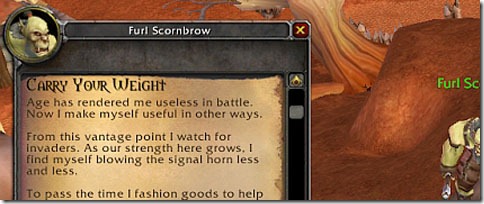
Welcome back for another week of cupcakes and snugly puppies.
Psych!
We both know we’re not here for that, so let’s get down to business. What follows will be Part 1 of an 18-part epic series. When I am through, angels will descend from on high and carry the compiled works to the Vatican for safe-keeping. Ages from now, historians will place this up there with The Illiad, Kafka’s Metamorphosis and Hitchhiker’s Guide.
Hey, a guy can dream right?
Recently we discussed the important roles and differences between the GM and the Raid Leader. In a 10-man strict guild, you may be able to get by with only have these two officers and some trusted guildies from whom you can expect honest answers. However, I find that even 10-mans and almost certainly 25-man raiding guilds run better with multiple officers.
In my experience, and from what I’ve been told by other leaders, there often arises a situation where guilds have officers who seem to be the Deputy of Do Nothing. (As opposed to my own favorite title: Deputy of Awesome.) I have found that this unique problem can stem from three sources.
- Not a Leader – These are the officers who may be great players, may be long-term guildies, but once they become an officer, they don’t really do much other than give their opinion when prompted by the RL or GM.
- Fatigued Leader – They were great officers but are not just phoning it in, and are only around out of a sense of obligation.
- No-Confidence Leader – They would do a great job, if they thought they had the back-up and the RAA to do it. As it stands, they feel that the average member has more say than them and may be tired of the squeaky wheel getting the oil.
The Deputy of Do Nothing is a drain on your raids efficiency and on the potency of your leadership team. As the Captain of this ship, it’s up to you to diagnose this malaise before it spreads to the rest of the crew.*
(* unless, of course, they have no authority while in raid and everyone knows it. In which case, carry on.)
Not too long ago, I read an article about someone who’s trying to have a “Guild Without Officers”. While I don’t agree with this idea, I thought the insights below were especially suitable to this conversation:
“I look back on how it used to be, with too damn many officers, all of whom did very little to actually help the guild, preferring instead to treat officership like some sort of insiders club where they could talk amongst themselves in their little clique. I recall making rules and chivvying and cajoling and beating my head against the brick wall that was getting anyone else to step up and take responsibility for anything.”
How do I spot this before it’s too late?
Part of being the GM includes an unwritten commitment to your members that you will make sure the rest of your leadership team has the responsibility, authority and accountability to handle their respective areas. Therefore, you MUST make sure that among your GM duties you include your due diligence. Kick the tires, shake the branches and see what turns up.
- Talk to your members. I’m sure you’re probably running heroics, or BGs or whiling away the hours getting that fishing feast while in Mumble with your teammates/members.
- Try to recall the last time you had an in-depth conversation with your officer.
- Did they prompt the conversation or did you?
- How many solutions did they present to the problems your team was encountering?
- How many of those solutions have been implemented?
- Review how organized/engaged their part of the team is on your forums. If this is something that is important to you or your guild community, your officers should be on top of it.
- Lastly, think of what you would be doing if you were in their position. Don’t think that just because you don’t play healer, you can’t tell a healing officer what to do. Management skills are not class-specific, and chances are you were once doing their job. At minimum, you will come up with some ideas to discuss next time you talk to them. At best you’ll see that there are opportunities that you both can capitalize upon.
How do I prevent this?
The first step in preventing anything, is to clearly state your expectations upfront. After all, human nature dictates that people will operate to the level that is expected of them, and if you don’t set that bar, you’re asking them to decide how to run your guild. You and I both know that the reason you promoted someone to a position of authority is because you trust their opinion, intelligence, communication skills and reliability. So the only thing missing is your guidance/structure to tell them how you want these skills applied.
- Rule #1: Do NOT promote all your friends.
- Rule #2: DO promote everyone you can trust in your absence
- If Rules 1 & 2 overlap, you should either make more friends are trust more people.
- Clearly define the duties of each officer position
- Grant them authority to do their job as they see fit. Nobody can do a job well if they think they have to ask permission.
- Agree upon how often you expect feedback from them. Ex: Post-Raid Debriefings, Weekly Status Reports or End-of-Tier strategy sessions.
- Make sure their position is easy enough for the rest of your team to understand. You don’t want anyone saying “what does he do again” or “he’s an officer just because he’s friends with XYZ, he doesn’t do anything”.
- Make sure they are NOT the type of person who settles for just doing their job description. Good leaders appreciate new talent and new ideas. Encourage those people who could probably do your job. They will keep you fresh and your team will benefit.
- Let them know that it’s acceptable to come to you for help BEFORE a fail.
- Establish a routine or set reminders for yourself to remember to review these steps and refine them where needed.
Next week we will continue and discuss what you can do once you’ve spotted the problem.
As always, comments, suggestions and questions are appreciated. Also, the CD of my stand-up routine is available at the table by the door. I’m here all week. Tip your waitress!


